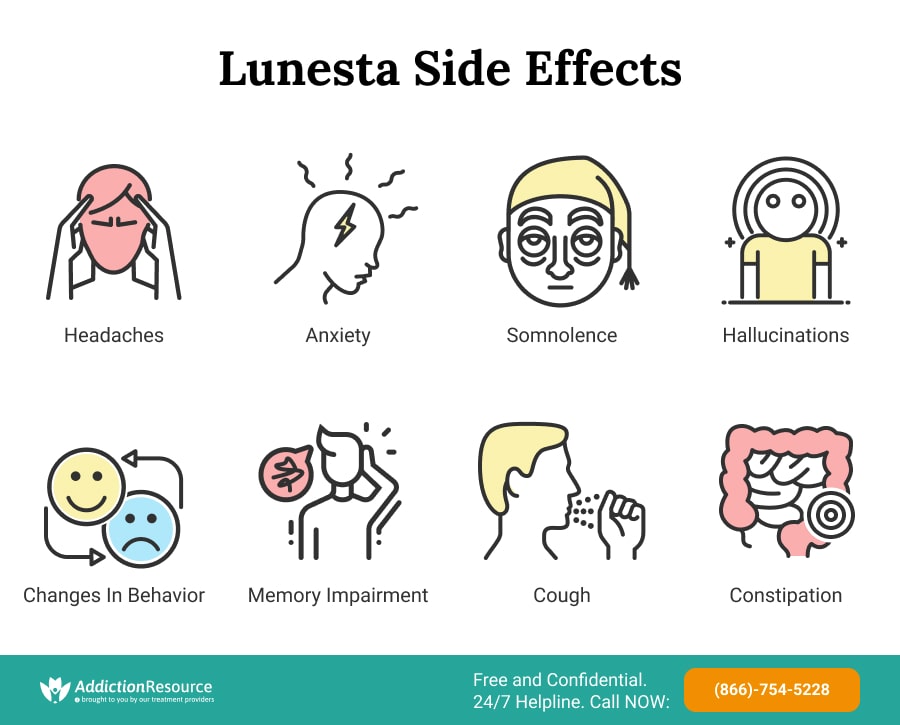Lunesta, the brand name for generic drug eszopiclone, is non-benzodiazepine acting as sedatives-hypnotics to treat acute and chronic insomnia. It interacts with the GABA receptors in the brain which regulate the sleeping pattern to produce a calming effect. It helps in getting better and longer sleep at night. Although taking it can help with conditions like insomnia still, like other sedative-hypnotics, there are several Lunesta side effects.
Table Of Contents:
It is a type IV-controlled substance that may lead to physical and psychological dependence. That is why its misuse and dependency need to be regularly monitored. In this article, detailed information about side effects, dangers of its long-term use, and liability of dependence on the drug will be provided to cover any queries.
Common Lunesta Side Effects
Lunesta (eszopiclone) is used in the treatment of sleeping problems. It is an approved medication for sleep improvement, maintenance, increase in quality and quantity of sleep as well as the improvement of next day function. It can help with transient and chronic insomnia and disturbed sleep schedules. While it is considered safe, it also has some undesirable effects.
Common Side Effects of Lunesta Include:
- headache
- dizziness
- anxiety
- metallic after taste
- daytime somnolence
More Severe Side Effects of Lunesta Can Range From:
- short-term memory impairment
- change in behavior
- aggression
- hallucinations
- self-harming thoughts
While headache dizziness and metallic taste are short-term side effects, others are especially manifested if one is taking its treatment for several months. These Lunesta Side Effects occur in less than 2% of individuals but taking more than the recommended dose can increase the frequency of these side effects. These effects can be physical as well as psychological and must be consulted with the doctor.

Physical Lunesta Side Effects
The most common side effects of lunesta reported on treatment with eszopiclone are dry mouth, metallic taste, and headache. Metallic aftertaste or bitter taste on tip of the tongue is reported by the majority of people taking it even with the first dose compared to the other side effects which are usually presented after long term use.
Other Physical Lunesta Side Effects Experienced by People Taking It Aside From the Ones Mentioned Above Are:
- Itchy rash on the skin
- Cough
- Stomach-ache
- Loss of appetite
- Daytime somnolence
- Hangover feeling
- Dizziness
- Constipation
Allergic reaction to this drug is rare, however, severe dizziness, rash itch, difficulty in breathing, swollen tongue are red flags for an allergic reaction that one should look out for. It can maintain its calming effects even after a full night’s sleep. This can result in daytime sleepiness and drowsiness. There should be at least 8 hours of sleep after taking medication to combat the daytime somnolence. It is also important not to exceed the recommended 2-3mg dosage. Exceeded amounts result in severe and long-lasting physical effects. Prevalence for these side effects is less than 2% of the medication is taken properly, in the recommended dosage, and without any other interacting substances.
Psychological Lunesta Side Effects
Eszopiclone works by interacting with GABA receptors in the brain. Where this interaction produces a calming effect for a sound overnight sleep, overuse of this drug can cause other psychological side effects. Most Common Psychological Lunesta Side Effects Include:
- Anxiety
- Mood swings
- Drug dependence
- Hallucination
One can Experience Severe Psychological Symptoms If The Use Of Medicine Is Dosage. These Are:
- Memory loss or amnesia
- Confused thoughts
- Aggressive behavior
- Abnormal self-harming thoughts
- Auditory and visual hallucination
- Agitation
- Jitters
- Worsening of depression
Another psychological complication experienced by less than 1% of people is somnambulism or sleepwalking. A person can have a conversation, eat, drive, go to places or even engage in sexual activity while still being asleep. Most people don’t have a memory of these events and this can impose serious effects on their social functioning. These symptoms are usually presented by patients who either take a high dose or take it with other recreational substances like alcohol or illegal drugs.

The Dangers Of Lunesta Long-Term Use
The medication is used as a short term treatment of insomnia. It is a type IV controlled substance which means its long-term use can lead to physical and psychological dependence. It not only has a potential addicting effect but can also cause severe adverse reactions on long-term use such as mood swings, drug tolerance, memory loss, depression, and in extreme cases it can even cause organ failure.
Drug Tolerance
Using eszopiclone is beneficial for the short-term treatment of insomnia but If the medicine is continued for a long time, drug tolerance can develop with Lunesta long term use. It will take more and more dosages of medicine to produce the same effect. This drug tolerance can potentially lead to overdose and a disturbed sleep cycle. Therefore, while it is safe for short-term treatment of insomnia, it is not recommended for long-term use.
Memory Loss
Memory loss is another one of Lunesta side effects that can occur after Lunesta long term use. It is used in the treatment of insomnia because it acts as a central nervous system depressant. It depresses nerve fiber firing in the central nervous system to reduce the stress response. Long-term CNS depression can lead to memory impairment and amnesia. This can be corrected by gradually decreasing the dosage and withdrawing the medication.
Depression
Side effects of Lunesta include worsening of existing depression symptoms and even causing depression in some patients. Low moods, suicidal thoughts, and irrational decisions are some other depression-related manifestations of using eszopiclone. If changes in one’s behavior are observed, a medical practitioner should be consulted immediately.
Organ Dysfunction
Our body has its drugs detoxification system. Disrupting the normal function of these organs is another complication of eszopiclone. Medicines are metabolized in the kidneys and liver. Taking a high dose of this medication for a long time causes stress on these organs and can lead to dysfunction. At the start, it can be reversed by simply withdrawing the medication slowly but as it progresses, it can enter an irreversible phase which can progress to end-stage organ failure. Therefore, it is important to take no more than the recommended medical dose and the recommended period.
Lunesta And Weight
Weight changes are rare and are reported by less than 1% of Lunesta (eszopiclone) users. It can cause weight fluctuation owing to its effect on the central nervous system and body metabolism. There are not many studies that focus on weight changes with eszopiclone use or provide information about its association but many patients reported noticing weight changes. Although Eszopiclone mechanism of action doesn’t directly affect weight still, its effect on the central nervous system and mild effect on metabolism can be indirectly linked to weight and body mass fluctuation in some people.
Lunesta And Weight Gain
Does Lunesta Cause Weight Gain?. This is the most common medical concern for people who are just starting on this medicine by their doctor. Although weight gain is not a severe side effect of Lunesta. People who are on Lunesta sometimes report feelings of hunger while they are on drugs. Its use can increase the appetite and cause weight gain. It can be carefully ministered by using dietary restrictions and having proper sleep.
Lunesta And Weight Loss
Weight loss is a very rare effect of Lunesta. Some people report unintentional weight loss with the use of this drug, which can be linked to its unpleasant or bitter after taste and dry mouth which can lead to loss of appetite. Loss of appetite may remain unnoticed by people but can cause weight loss due to lack of proper nutrition. The studies still have to provide information about their direct association with each other.

Lunesta In Pregnancy
The use of the drug in pregnancy is still under debate and information about its use in pregnancy is lacking. There are no controlled human trials proving its effect on pregnancy, this is why one should take extra caution while using it during pregnancy. It is labeled as FDA category C, which means it should only be prescribed with consideration. A pregnant woman should use it only under the doctor’s recommendation. There are not many studies that identify its risk factors and interaction in pregnant women and nursing mothers.
It can only be prescribed if the beneficial medical effects outweigh the potential risk to the health of the fetus.
Preventing Lunesta Side Effects
This medication is a relatively safe drug, and if taken properly, less than 2% of people experience these side effects. Management of these side effects is important for the patient’s comfort and medical needs. These side effects can be reduced by taking only the recommended dosage. Having a window period of 8 hours to sleep can help with dizziness. For the common side effects, waiting for our body to adjust to the drugs is often the best option. Limiting the use of drugs like CNS depressants or alcohol can help with drug interactions. If these symptoms become severe, switching to another medicine under the doctor’s advice can be considered. It is important to have the proper information and these decisions should only be taken under the guidance of a doctor and consultation of a healthcare professional.
Hope Without Commitment
Find the best treatment options. Call our free and confidential helpline
Most private insurances accepted
Page Sources
- Greenblatt, D. J., & Zammit, G. K. (2012). Pharmacokinetic evaluation of eszopiclone: Clinical and therapeutic implications. Expert Opinion on Drug Metabolism and Toxicology, 8(12). https://doi.org/10.1517/17425255.2012.741588
- Halas, C. J. (2006). Eszopiclone. American Journal of Health-System Pharmacy : AJHP : Official Journal of the American Society of Health-System Pharmacists, 63(1). https://doi.org/10.2146/ajhp050357
- K., M., A., A., & N., H. (2014). Evaluation of the efficacy and adverse effect (unpleasant taste) of eszopiclone in Japanese patients. International Journal of Neuropsychopharmacology, 17(SUPPL. 1).
- Monti, J. M., & Pandi-Perumal, S. R. (2007). Eszopiclone: Its use in the treatment of insomnia. Neuropsychiatric Disease and Treatment, 3(4).
- Rösner, S., Englbrecht, C., Wehrle, R., Hajak, G., & Soyka, M. (2018). Eszopiclone for insomnia. In Cochrane Database of Systematic Reviews (Vol. 2018, Issue 10). https://doi.org/10.1002/14651858.CD010703.pub2

 Authored by
Authored by  Reviewed by
Reviewed by 
